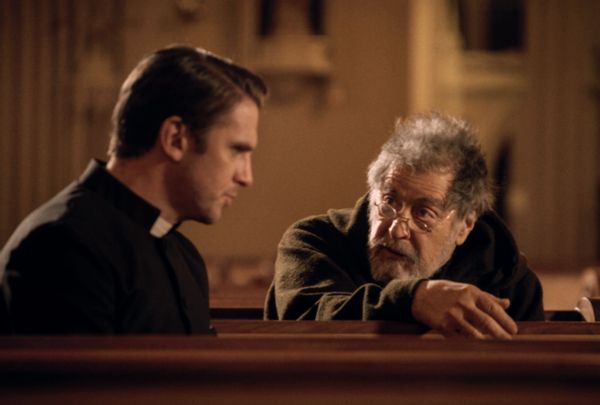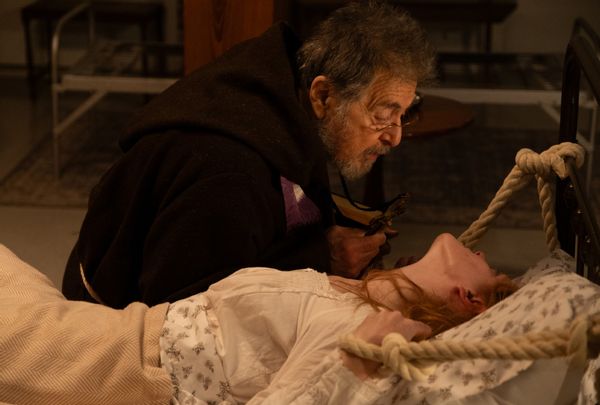Vice President and sentient gravy stain JD Vance was jokingly credited with the death of Pope Francis in April, as evidenced by numerous memes and comedic riffs still circulating. It’s a rash indictment; in pop culture’s haste to identify Francis’ killer, the possibly fatal prescience of Edward Berger’s “Conclave,” a film about the nuts, bolts and holy smokes involved in the election of a new pope, was overlooked. Did Vance’s handshake send Francis to the hereafter, or Berger’s creative hubris?
It’s the plain old unsexy truth that a cerebral stroke and subsequent cardiac arrest killed Pope Francis, not Vance’s touch or Berger’s cinema. Think of “Conclave” as a mixed blessing: it’s a wonderful movie, structured around an ensemble whose work is equal to any other seen in 2024’s offerings, notably Ralph Fiennes, Lucian Msamati, a perfectly unctuous John Lithgow and Isabella Rossellini, delicate with her sassiness; it is also instructive of how the church, as a universal body, responds to a pope’s death, and why their passing is consequential to those outside the faith (or who simply have none).
Whether one identifies as an atheist, Jew, Buddhist, Muslim, Hindu, or subscribes to countless other forms of spiritual worship, our world is shaped by Christian thought. Christianity enjoys appallingly outsized influence, certainly; it’s the largest religion in the world, but comprises just a third of the global population, meaning the far-right Christofascists weaseling their way into elected office in developed nations intend to legislate according to a doctrine that swaths of their constituents don’t follow. If you live in the United States, where 62% of adults identify as Christian, and if you don’t attend church on Sundays or any days, you’re nonetheless subject to policies promoted by looney tunes Bible-thumpers who pray over Donald Trump, quite arguably the most irreligious man to set foot in the White House since Thomas Jefferson.
Dan Stevens in “The Ritual” (XYZ Films)
For that reason alone, “Conclave” is resonant, though besides the matter of personal meaning, it’s a solid theopolitical thriller. Amusingly enough, the film’s success, and the fact of its production, provide only thin evidence of Christianity’s presence in our lives; movies like it come around only every so often, and make a splash in pop culture but rarely. (Look back to 2015’s “Spotlight” for a salient recent example.) Better proof of Christianity as an immovable societal cornerstone can be found in horror cinema, particularly within its religious subgenre, which broadly comprises films concerned with the Good Book and the rites, parables and dogma contained within its pages. Even in the 2020s, marked by a decline in the United States’ Christian population, as well as similar dips in the United Kingdom and Europe, horror still equates “religion” with “Christianity.”
 Dan Stevens and Al Pacino in “The Ritual” (XYZ Films)
Dan Stevens and Al Pacino in “The Ritual” (XYZ Films)
Horror still equates “religion” with “Christianity.”
Consider 2024’s religious horror slate: Michael Mohan’s “Immaculate,” Arkasha Stevenson’s “The First Omen,” Joshua John Miller’s “The Exorcism,” Lee Daniels’ “The Deliverance,” Max and Sam “Brothers of Robert” Eggers’ “The Front Room,” Scott Beck and Bryan Woods’ “Heretic.” Each is designed around Christian faith like it’s the rug that ties the room together; each falls somewhere on the spectrum of “great” to “watchable trash,” too, which appropriately feels downright miraculous. To this number we can now add David Midell’s new film “The Ritual,” carrying through last year’s religious horror sub-theme with a janky docu-realism affect; Midell borrows the aesthetics of workplace sitcoms like “The Office,” favoring contrasty lighting and shaky handheld camerawork in recreating Anna Ecklund’s decades-long bout of demonic possession in the early 1900s.
Start your day with essential news from Salon. Sign up for our free morning newsletter, Crash Course.
“The Ritual” does not identify Anna by that pseudonym, of course. It’s an historical film, and uses her real name, Emma Schmidt (Abigail Cowen), alleged to have endured her condition starting at age 14 until 46, the year of her final exorcism by Father Theophilus Riesinger (Al Pacino); per the film’s promotional materials and subtitles, Emma’s is the best-documented case of demonic possession in 20th century history. Midell latches onto that historical angle, which reads as an intentional creative decision as well as a moral one; if Emma’s ordeal is more thoroughly annotated than others’, a modicum of respect is owed to the record and to her suffering, whether it was a consequence of human ignorance or the genuine article in mankind’s long tradition of misdiagnosing behavioral health maladies as infernal.
 Al Pacino and Abigail Cowen in “The Ritual” (XYZ Films)
Al Pacino and Abigail Cowen in “The Ritual” (XYZ Films)
Reason aside, Midell fumbles the approach; each night that Theophilus and his comrade in divine arms, Father Joseph Steiger (Dan Stevens), administer a new section in the rite of exorcism to Emma, the film abruptly jump cuts to postmortem conversations where, for instance, Joseph communicates his doubts to Theophilus that the woman needs an exorcism at all, or where they and the nuns assisting them experience awful visions in their bed chambers. The technique breaks the film’s faux-authentic spell: when the story leaps forward in time without considering details like architecture, whatever mild power the material holds instantly wanes. (The layout of the movie’s location is such an afterthought that when Joseph appears on sets other than Emma’s chamber, he seems to practically have teleported to them.)
Proof of Christianity as an immovable societal cornerstone can be found in horror cinema, particularly within its religious subgenre, which broadly comprises films concerned with the Good Book and the rites, parables, and dogma contained within its pages.
If there is any choice more capable of reminding the audience that “The Ritual” is one more demonic possession movie in a long line of movies, based on real events and just as anonymously crafted (a’la “The Devil Inside” and “The Vatican Tapes”), Midell doesn’t make it. Credit where due, though: the script, which he wrote with Enrico Natale, packs food for thought into a low-key speech, delivered by Pacino 17 minutes in, about the peril of division. Contextually, the monologue is faith-based. “I know this is all unusual, this aspect of our calling,” Theophilus tells Joseph and their assembled team of nuns, including Sister Rose (Ashley Greene). “It will be like entering a foreign land to you.” If his words literally refer to exorcism’s particularities, they subtextually wrestle with faith as a notion, and trickle into broader political life, too.
A divided collective will fall, Theophilus concludes. In one way, he’s right: discord in the American electorate yielded Donald Trump 2.0, which in turn has yielded one travesty after another in his 130-plus days in office. If we can’t find common ground to stand on with each other–ideally, that fascism is bad and its practitioners must be corralled in the far corners of suitable wastelands–then we all pay the consequences. But “The Ritual” centers so much on Joseph’s disbelief in Theophilus’ absolute belief in Emma’s possession, and in the existence of demonic power, that the film almost functions as a dialogue about the rationality of Christian faith itself. Is Theohilus right to permit Emma’s deterioration without the benefit of a medical (read: scientific) examination? Do demons exist? Or is Theophilus acting in actual bad faith, so convinced by his preferred mythology that he’s unworried about any harm the rites of exorcism inflict on Emma? And how does a man like Joseph, an authority figure in the church but on a lower rung than Theophilus, conduct himself under those circumstances?
Francis contended with formulations of these questions throughout his papacy. Being a progressively minded sort compared to his peers, the new pope, Leo XIV, inevitably will tackle those same questions as he begins his papacy. In some ways, Leo is the successor Francis deserves, likewise an advocate for social justice, whether championing migrants’ rights or women holding leadership roles in the Catholic Church, but less accepting of LGBTQ+ communities. As such, he has already been made a lightning rod for right-wing culture war tantrums–the exact kind of division Theophilus warns against in “The Ritual.” Under these circumstances, and as the current representative of religious horror, the relevance of its plot is appreciable. Nonetheless, it’s a sin that the film itself falls so short of its moment.
Read more
about religious horror




























